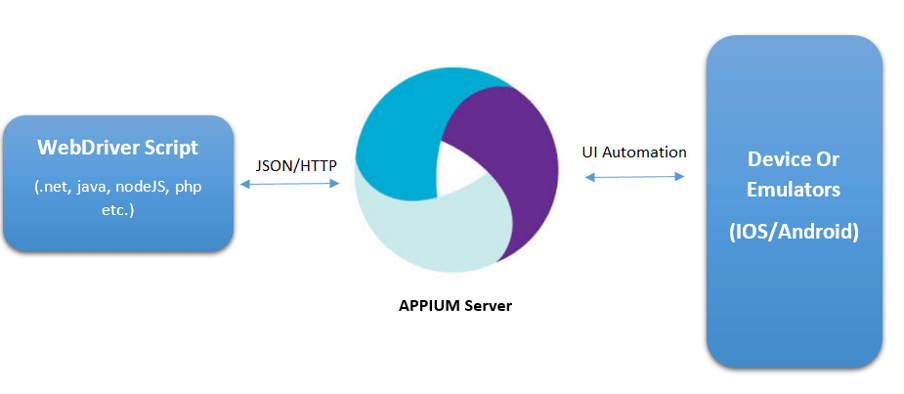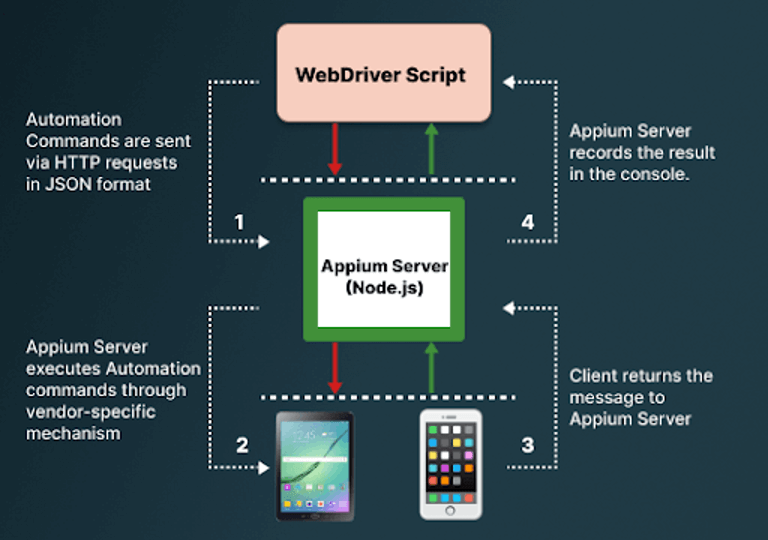In today’s world, mobile applications have become an essential part of our everyday lives, and businesses are progressively investing in mobile app development to hit a broader audience. As a result, the demand for mobile application tests has also increased significantly.
According to Statista, globally, mobile app downloads have been rising continuously from 2016 onward, exceeding 200 billion in 2019. In the freshly calculated year, consumers downloaded 255 billion mobile applications to their linked devices, up by more than 80% from 140.7 billion application downloads in 2016.

As more and more enterprises move towards mobile apps, it is crucial to ensure that these apps are secure, reliable, and user-friendly. This is when Mobile testing comes into play. However, mobile app testing across different devices and platforms can be daunting. Appium is one of the most preferred and open-source automation tools for mobile app testing that lets you write tests that can execute on multiple platforms (Android, iOS) and devices (tablets, phones).
Being the widely used and best option obtainable today in the market, it is extensively adopted by modern enterprises to generate a comprehensive mobile automated test framework. With a stronger community and an emergent user base, it is simpler to accept and implement, so organizations are adopting it on a huge scale. The best thing about Appium is that it allows you to write in distinct languages supported by Selenium by utilizing WebDriver API.
This article will explore how to use Appium for cross-browser platform mobile app testing.
What is Appium?
Appium is an open-source mobile automated test tool that allows you to test hybrid, native, and mobile web apps. It works on Android and iOS platforms and supports an extensive range of programming languages, counting JavaScript, Python, Java, Ruby, etc., making it a versatile tool for testers and developers. Appium utilizes the WebDriver protocol to automate mobile applications, which means you can use similar API and syntax calls to automate both mobile and web apps. Appium has more than 5.7K Fork and 15.3K Star on GitHub.
Like the Selenium test automation tool, Appium also supports multiple frameworks and programming languages for mobile automation tests like JavaScript, Java, Python, C#, PHP, etc.
With the Appium automated testing framework, you can execute app test automation of,
- Hybrid apps: These apps are built by wrapping around a “webview,” a native control that enables interaction with website content. You can access hybrid applications from a browser URL and a physical device.
- Native mobile apps: Such applications are installed on the gadget or device and written using iOS, Android, and Windows SDKs.
- Mobile web apps: The web applications are accessed in web browsers such as Safari and Google Chrome. You can also access mobile web apps using in-app browsers for iOS and Android.
Traits of Appium
- Appium doesn’t require app source code or a library.
- Appium offers an active and robust community.
- Appium has multiple platform assistance, i.e., it can run similar test cases on various platforms.
- Appium enables the parallel implementation of test scripts.
- In Appium, a smaller modification doesn’t require re-installation of the app.
- Appium supports multiple languages such as Python, C#, Java, PHP, JavaScript, Ruby with node.js, and several others with a Se (selenium) client library.

Overview of Appium 2.0
Appium 2.0 (still beta) reenvisions or redesigns Appium as a platform wherein “plugins” and “drivers” can be simply formed and shared independently.
Why Is Appium the Most Preferred Tool for Automating Mobile Apps?
Appium is an advanced “cross-platform tool,” i.e., it lets you write tests on several platforms (Android, iOS, Windows), utilizing the same Application Programming Interfaces. Using Appium, you also execute automated testing on real gadgets/ devices like mobile phones, tablets, etc.
It is an extensively used tool for regression tests of Mobile Applications on tablets and mobile phones. Appium makes mobile application regression tests easy, mainly for huge mobile applications that are advanced or updated frequently with new functionalities and features.
Why Use Appium for Cross-Browser Platform Mobile Testing?
There are multiple reasons why you must use Appium for cross-platform mobile tests:
- Open-Source: Appium is a free or open-source test automation tool, so you do not have to pay anything to utilize it. You also get access to a big community of testers and developers who can assist you with any problem you may face.
- Easy to Setup: This tool is simple to set up & get started with. You do not need exceptional knowledge or skills to use it.
- Write Once, Run Anywhere: With this tool, you can write tests once & execute them on multiple devices and platforms. This saves you much time and effort compared to writing individual tests for each device and platform.
- Supports Both Android and iOS: Appium supports both Android and iOS platforms, so you can test your application on both platforms using a similar tool.
- Supports Multiple Programming Languages: It also supports several programming languages, such as JavaScript, Java, Python, Ruby, etc., so you can quickly write tests in the language you are most comfortable with.
Here are some crucial pointers that keep Appium ahead of other frameworks or tools –
- Like Selenium Server, this specific tool works like a server & runs in the background.
- Appium has a built-in UI Automator to inspect mobile applications to get comprehensive information logs & reporting structures.
- Appium enables you complete access to back-end databases and APIs from test scripts.
- It can automate any mobile application built in various programming languages and frameworks.
- It makes regression tests of mobile applications simpler.
- Appium synchronizes well with the TestNG test framework.
- It does not need installation on mobile devices for mobile app tests.
- Appium uses Selenium WebDriver JSON Protocol to function with native iOS and Android mobile apps.
- Using Appium, you can test applications on Emulators & Simulators and real-time device cloud.
- You can run parallel tests of your Appium automated scripts with UIAutomation, UIAutomator, and Xcode. Check our guide on the Appium Parallel test.
Appium Framework Architecture
This section of the Appium test guide looks at the Appium framework’s architecture. The Appium Architecture comprises three components –
- Appium Server: Appium Server is an HTTP server that gets JSON-formatted command requests from the customer. It uses Node.js, and commands are then implemented on mobile gadgets. Thus, installing the server on the machine earlier executing the test script is suggested.
- Appium Client: The Appium customer comprises scripted automation code written in famous programming languages like Python, Java, Perl, Ruby, etc. The automated scripts comprise the configuration specifics of the device and app. These scripted and configuration facts are used in executing the test cases.
- End Device: End Device refers to simulators, emulators, and a physical gadget linked to the Appium server wherein tests are run.
How does Appium work?
In this section of the Appium tests tutorial, we will dive deep into the functioning of the Appium framework.
This tool is a Node.js HTTP server that uses the REST Application Programming Interface. The customer interacts with the Appium server via REST APIs, which the Mobile JSON Wire Protocol regulates. The REST APIs listen for commands, accept client connections, implement commands, and return the command implementation status.
- The prime step to run the Appium test is to make a session.
- During a session, the customer sends a request to the server comprising session-centric information in key-value pairs, also called Desired Competencies. The Desired Proficiencies enable Appium to distinguish between platforms (Android or iOS) and fire up a session on the mobile gadget, iOS Simulator, or Android Emulator.
- Utilizing the JSON object (Desired Competences), the POST request is directed to the server, and Appium reacts to it in the form of a session id.
- Once the session is done, the customer & Appium server can communicate.
Appium function distinctly on platforms like iOS and Android. In the subsequent section of this Appium test tutorial, we will glance at how Appium works on iOS and Android.
Getting Started with Appium
Before we plunge into how to utilize Appium for cross-platform mobile tests, let us first go through the fundamentals of setting up Appium.
- Install Node.js: This tool is built on Node.js, so you will need to install Node.js initially. You can download Node.js from the authorized site: https://nodejs.org.
- Install Appium: As Node.js is installed, you can also install Appium utilizing the following command:
npm install -g appium
- Install Appium Client Libraries: You must also install the client libraries for your preferred programming language. For instance, if you are using Java, you need to install the Java client library utilizing the following command:
npm install wd
- Install Mobile Device Emulators: ultimately, you must install emulators for the mobile gadgets you wish to test. For instance, if you want to test on an Android device, you must install the Android emulator and SDK.
Once you install all the essential components, you can begin using Appium.
How does Appium work?
Appium interacts with a mobile app automatically by leveraging the behavior of several components like text boxes, buttons, and links in the User Interface. It can be reused for writing and running testing recurrently against the given app at multiple sessions.
Here’s how Appium functions for iOS and Android mobile devices:
Appium on Android Device
To meet up with users’ necessities for an app, Appium tests can be used to check and confirm the reliability and functionality of the mobile app. Appium tests on particular Android gadgets let QA testers confirm that the apps work as projected in actual user conditions. It also assists in confirming optimal consistency in deliveries.
This tool uses the UI Automator test case to test the Android UI (user interface) to automate Android gadgets. The UI Automator is a native User Interface automation framework for Android.
Best Practices to execute Appium test on Android devices
- Download the essential elements to run the testing, like Java, Appium Jar files, and Appium Server.
- Install Java on the system & set the environment variables.
- State the desired capabilities (values and keys the customer sends to the server). It can either be set in the appium.txt files or the test code.
- The test code assists in testing the Appium test scripts required to run Appium tests on Android gadgets.
- Write its test scripts for your Android devices with the software developer mode option on or enabled.
- Execute tests on actual Android devices to confirm optimum user-friendliness.
Appium on iOS Device
Like Android gadgets, Appium uses Apple UIAutomation Application Programming Interface to test the UI (user interface) component to automate apps on IOS apps. It uses the principle of RESTful services by directing JSON files. These files then function with an iOS app using UI components such as text labels and buttons via Apple’s UIAutomation API for mobile app testing.
Best Practices to execute Appium test on iOS devices
- Install & then launch the Appium server on the gadget before starting the test procedures.
- Get the essential information of the iOS device utilized for testing to set the preferred competencies — details like the device name, IOS version, and bundled.
- Generate a new project in Eclipse for writing the Appium test scripts for your IOS gadgets.
- Inspect the User Interface for IOS utilizing Appium Desktop Inspector. It can also be used for recording functions for exact debugging.
- Run tests on actual devices rather than virtual devices to get the projected outcomes.
Limitations/ Drawbacks of Appium Framework
Shown below is the restriction of the Appium framework.
- Currently, Appium tests with Android do not support Android versions below 4.2.
- Restricted community support.
- Appium desktop inspector can’t be run straight on Microsoft Windows.
- The test implementation is slow while running Appium tests on the iOS platform.
- It does not support the old version of Android APIs.
- Setting up and configuring Appium for iOS and Android is a time-consuming approach.
- It needs to generate comprehensive test reports.
- Appium tests can occasionally be flaky.
How do I get started with Appium with LambdaTest?
Appium is an outstanding framework to count in your automated test plan. But, it is crucial to run Appium testing efficiently. Setting up, executing, & scaling in-house gadget labs is expensive. This demands the usage of an actual device cloud-centric platform like LambdaTest. With its online device farm, you can eliminate your in-house device laboratories and enable your testers and developers to conduct Appium tests on real-time devices at any time from anywhere.
About LambdaTest
LambdaTest is a cloud-based digital experience testing platform that allows developers and testers to perform fast, secure, and scalable automated and manual testing of mobile and web apps across 3000+ browsers, OSs, and real device combinations. Using LambdaTest, companies can ensure rapid developer feedback and thus accomplish a fast go-to-market. Over 500 companies and 1 M+ users across 130+ nations depend on LambdaTest for their testing requirements.
Getting Started with Appium test on LambdaTest
To begin Appium tests on LambdaTest, you can check Appium test support documentation for an orderly procedure to execute your first Appium test script on a cloud-based Appium Grid. So you do not have to worry about the setbacks with Appium infrastructure as we will give you a cloud Appium Grid with “0” (zero) downtime.
One of the most exciting facts is that your first 100 Appium test minutes are on us with a free sign-up. Furthermore, you can also avail profits of manual app tests, cross-browser tests, Visual UI testing, responsive tests, and more with a lifetime of free entree to LambdaTest, the world’s rapidly-growing test orchestration and implementation platform.
Conclusion
Appium is a powerful and popular tool for cross-platform mobile tests in 2023. With Appium, you can streamline your mobile test process and enhance the mobile app’s quality, guaranteeing a better user experience for your users. As the mobile scenario continues to evolve, Appium remains a valued tool for mobile app tests and will remain a main element of any mobile test strategy in the future.
To keep up with the demands of reliable and fast testing that spans numerous platforms, gadgets, and versions, Appium mobile app test is indispensable. Chosen throughout the industry, Appium provides flexibility, feasibility, and cost-friendliness above other test approaches, letting QA teams deliver higher user experiences within the CD (continuous delivery) approach.
Frequently asked questions (FAQs)
1. What are the programming languages that can be used with Appium?
Appium supports many programming languages, counting Ruby, Python, Java, and JavaScript.
2. What are the platforms that are compatible with Appium?
Appium supports cross-platform tests on iOS and Android devices, & web apps.
3. What is the suggested approach for setting up a mobile test environment with Appium?
The suggested approach is to set up a local test environment using emulators or physical devices linked to the Appium server executing on your local machine. On the other hand, you can use a cloud-centric test service that provides access to various platforms and devices.
4. What is the procedure for creating test scripts with Appium?
You can generate test scripts via any programming language of your preference and use the Appium APIs to communicate with the mobile app. The APIs offer various functions to interact with the mobile application, such as searching components by clicking buttons, ID, and entering text.
5. How do I troubleshoot test scripts that fail during implementation?
You can utilize the debugging features of your Integrated Development Environment (IDE) to step through your test script and find any errors. You can also use the Appium logs to find any exceptions or errors that arise during the test implementation.
6. How do I incorporate Appium into a CI/CD pipeline?
You can incorporate Appium into your Continuous Integration/Continuous Deployment (CI/CD) pipeline by automating your test scripts in test automation to execute as part of the pipeline. Appium offers incorporations with popular Continuous Integration/Continuous Delivery (CI/CD) tools like CircleCI and Jenkins.
7. Can Appium be quickly learned by beginners?
Yes! The learning curve of Appium is fairly easy and simple. Appium utilizes the remote WebDriver protocol and has compatibility with multiple programming languages and testing frameworks. You can start your Appium test journey if you have decent experience writing tests in varied languages such as PHP, Java, C#, Python, and others.
8. What is Appium utilized for?
Appium is a free/ open-source framework to execute app test automation on iOS, Android, and Windows platforms. Appium can automate the testing of mobile applications that are developed using iOS, Android, or Windows Software Development Kits (SDKs), regardless of whether they are native, web, or hybrid apps.
9. Does Appium require coding?
Yes, Appium does necessitate coding knowledge as it is a free/ open-source automated testing framework perfectly designed for use with several programming languages like Python, Java, JavaScript, and more. While Appium offers a GUI (graphical user interface) for test setup and execution, it still necessitates the user to write code to generate and run test cases. But, with the aid of codeless test tools built on top of Appium, users with partial coding knowledge take advantage of the capabilities of Appium for testing mobile apps.

